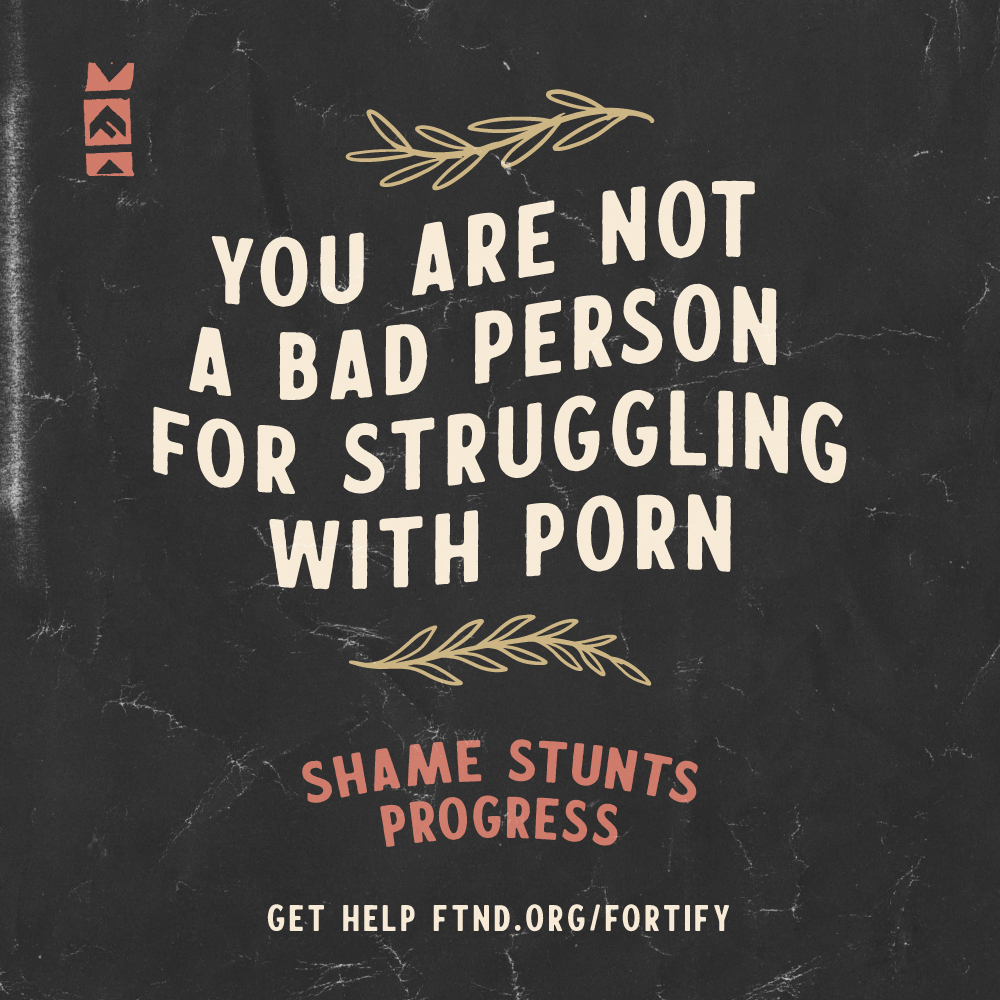Fight the New Drug is an awareness organization educating about the harms of pornography on individuals, relationships, and society. We share research, facts, and personal accounts to help promote understanding for various aspects of this multi-faceted issue. Our goal is to maintain an environment where all individuals can have healthy and productive conversations about this issue, while acknowledging that this issue can impact any person or relationship differently.
Since Fight The New Drug was founded over a decade ago, we’ve set out to change the conversations on porn in society and educate on its harmful effects. Given that porn is often a “taboo” topic in society, we’ve been a witness to and started some life-changing and challenging conversations.
After all, having open, honest, shame-free conversations about porn’s harms is a key objective in this movement.
Over the years, a common question we’ve seen has to do with our signature phrase, “Porn Kills Love.” You’ve probably seen it printed on our hats, tees, and stickers or shared on social media as a way to raise awareness about the harms of porn.
Related: How Porn Can Negatively Impact Love And Intimacy
For some, this phrase comes across as shaming, and they may think that “Shame Kills Love” is more accurate to the issue rather than porn itself. It can seem like, for some people, that they want to “fight the true drug” of shame, not porn itself, because shame is more harmful than porn. We hear those people, and we want to make it clear that perpetuating shame absolutely is not and has never been our intent as an organization. We’re an anti-shame organization, and for those who understand its meaning the way it’s intended, “Porn Kills Love” can be educational, empowering, and effective. After all, research shows that feelings of shame fuel hypersexual behavior, including increased porn consumption, while guilt fuels change, which is one of the many reasons why we’re anti-shame.
Does “Porn Kills Love” shame consumers?
Decades of research from major institutions supported by countless personal accounts from people all over the world confirm that porn is, in fact, not harmless, and we wouldn’t be doing society a service by saying it is. All someone has to do is evaluate the existing research on porn to understand that this issue is bigger than what you might normally hear about porn being a tool to “express sexuality” or “spice up relationships.”
Related: Here’s Why Those Who Struggle With Porn Aren’t Bad People
“Porn Kills Love” is an impactful statement that is meant to spark awareness and motivate a change in perspective in our porn-saturated world. It encompasses, in a simplified statement, what the research is saying about porn’s impact on society as a whole, as well as individuals and their ability and/or desire to healthfully bond with others.
Our declaration is “Porn Kills Love” not that “insert consumer’s name” kills love. Our message is directed at porn itself, not at the person who consumes it. In fact, consider how most porn consumers have no idea that porn is harmful—and why would they? We live in a world where porn is completely normalized, celebrated, and even promoted.
Many times, when someone who regularly looks at porn finds our awareness campaign for the first time, they’re able to understand for themselves the big picture of how porn has negatively affected them. This is why we direct our awareness campaign to educate about the harmful effects of porn as a product so individuals can make an educated decision for themselves, not as a campaign aimed at making consumers “feel bad” about engaging with it. How persuasive would a shame-driven campaign be, especially given the research that says feeling shame fuels hypersexual behavior, including porn consumption?
Do we want every individual to experience deeper connections, confidence, and a sense of control in their lives? Absolutely, and recognizing porn for the toxic influence it is can be a great first step to change. And those changes in behavior may spark feelings that motivate healthier changed behavior. Ultimately, that process and those feelings must come from within the consumer them self as they understand how porn can be harmful.
That being said, “Porn Kills Love” has been used as a weapon to shame—sometimes unintentionally by well-meaning anti-porn advocates—but we do not endorse that kind of dialogue, and we do not intend for it to be shaming, ever.
Does “Porn Kills Love” shame people in the industry?
It’s no secret that the porn industry is responsible for producing a product that’s damaging to consumers as well as themselves. But while “Porn Kills Love” is directed at the industry as a whole and the product of porn itself, that doesn’t mean it should be used to shame individuals involved in its production.
We don’t intend to allow the dark secrets within the industry to remain hidden by removing shame. However, the weight of porns harms clearly can’t be placed on one person or one performer alone. This is a complex issue with many players and contributors—some of whom aren’t in the industry by choice, or are coerced, manipulated, or forced to do more than they signed up for. Many performers only chose to be in the adult industry because it was the last resort for any kind of financial stability.
Related: How Shaming And Victim-Blaming Porn Performers Adds To Their Mistreatment
While we do intend to raise awareness on the harm porn inflicts on consumers, their relationships, and the trafficking and abuse within the industry, “Porn Kills Love” isn’t intended to shame individuals—whether inside or outside of the industry.
Why we use “Porn Kills Love” for positive change
Helping people recognize that porn is harmful isn’t about shaming them, it’s about inviting them to truly consider how porn impacts their life.
Recognizing porn’s harms can inspire a perspective shift that makes porn less appealing, and makes life happier, healthier, and better connected without it—both for individuals and their relationships, and those who are harmed in the production of porn.
We understand that “Porn Kills Love” can come across as shaming in certain contexts, and—no matter how well-intended—this is not healthy or helpful, nor is it what our organization promotes.
The positive impact of “Porn Kills Love” continues to outweigh the negative, and we’ll only continue to see improvement as we better society’s understanding of what this message really means.
After all, everyone is deserving of love, everyone has the capacity to make a positive change in their lives, and everyone deserves more than porn.

Your Support Matters Now More Than Ever
Most kids today are exposed to porn by the age of 12. By the time they’re teenagers, 75% of boys and 70% of girls have already viewed itRobb, M.B., & Mann, S. (2023). Teens and pornography. San Francisco, CA: Common Sense.Copy —often before they’ve had a single healthy conversation about it.
Even more concerning: over half of boys and nearly 40% of girls believe porn is a realistic depiction of sexMartellozzo, E., Monaghan, A., Adler, J. R., Davidson, J., Leyva, R., & Horvath, M. A. H. (2016). “I wasn’t sure it was normal to watch it”: A quantitative and qualitative examination of the impact of online pornography on the values, attitudes, beliefs and behaviours of children and young people. Middlesex University, NSPCC, & Office of the Children’s Commissioner.Copy . And among teens who have seen porn, more than 79% of teens use it to learn how to have sexRobb, M.B., & Mann, S. (2023). Teens and pornography. San Francisco, CA: Common Sense.Copy . That means millions of young people are getting sex ed from violent, degrading content, which becomes their baseline understanding of intimacy. Out of the most popular porn, 33%-88% of videos contain physical aggression and nonconsensual violence-related themesFritz, N., Malic, V., Paul, B., & Zhou, Y. (2020). A descriptive analysis of the types, targets, and relative frequency of aggression in mainstream pornography. Archives of Sexual Behavior, 49(8), 3041-3053. doi:10.1007/s10508-020-01773-0Copy Bridges et al., 2010, “Aggression and Sexual Behavior in Best-Selling Pornography Videos: A Content Analysis,” Violence Against Women.Copy .
From increasing rates of loneliness, depression, and self-doubt, to distorted views of sex, reduced relationship satisfaction, and riskier sexual behavior among teens, porn is impacting individuals, relationships, and society worldwideFight the New Drug. (2024, May). Get the Facts (Series of web articles). Fight the New Drug.Copy .
This is why Fight the New Drug exists—but we can’t do it without you.
Your donation directly fuels the creation of new educational resources, including our awareness-raising videos, podcasts, research-driven articles, engaging school presentations, and digital tools that reach youth where they are: online and in school. It equips individuals, parents, educators, and youth with trustworthy resources to start the conversation.
Will you join us? We’re grateful for whatever you can give—but a recurring donation makes the biggest difference. Every dollar directly supports our vital work, and every individual we reach decreases sexual exploitation. Let’s fight for real love:



